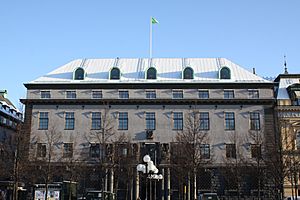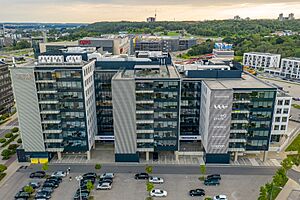SEB Group facts for kids
 |
|

SEB's corporate headquarters at Kungsträdgårdsgatan 8 in Stockholm
|
|
| Publicly traded Aktiebolag | |
| Traded as | OMX: SEB A |
| ISIN |
|
| Industry | Financial services |
| Predecessor | Stockholms Enskilda Bank (established in 1856) Skandinaviska Banken (established in 1864) |
| Founded | 1972 |
| Headquarters | Stockholm, Sweden |
|
Key people
|
Johan Torgeby (President and CEO), Marcus Wallenberg (Chairman) |
| Products | Corporate and Institutional Banking Retail banking, wealth management, life insurance, pensions |
| Revenue | SEK 80.19 billion (≈ USD 7.56 billion) (2023) |
|
Operating income
|
SEK 47.96 billion (≈ USD 4.52 billion) (2023) |
| SEK 38.12 billion (≈ USD 3.59 billion) (2023) | |
| AUM | SEK 2.361 trillion (≈ USD 223 billion) (2022) |
| Total assets | SEK 3.608 trillion (≈ USD 340 billion) (2023) |
| Total equity | SEK 221.78 billion (≈ USD 20.90 billion) (2023) |
| Owner | Investor AB (21.32%) AMF Pension & Funds (5.04%) |
|
Number of employees
|
17,500 (FTE, end 2023) |
| Subsidiaries | SEB A/S (Denmark) SEB Pank (Estonia) |
| Footnotes / references Source: SEB's Annual and Sustainability Report 2023. https://sebgroup.com/annualreport |
|
SEB is a big bank from Sweden. Its full name is Skandinaviska Enskilda Banken AB, which means "Scandinavian Private Bank." SEB has its main office in Stockholm, Sweden.
In Sweden and countries like Estonia, Latvia, and Lithuania (called the Baltic countries), SEB offers all kinds of banking services. This means they help people and businesses with their money. In other countries like Denmark, Finland, Norway, Germany, and the United Kingdom, SEB mainly helps large companies and financial groups.
The bank was started in 1972 by the Wallenberg family from Sweden. This family is still the biggest owner of SEB through their investment company, Investor AB. SEB is currently the largest bank in Sweden based on its value and total assets.
SEB's history goes back to two older banks: Stockholms Enskilda Bank (started in 1856) and Skandinaviska Banken (started in 1864). Both banks were very important in helping industries grow in Scandinavia, especially in Sweden, during the late 1800s and early 1900s. After growing a lot, these two banks joined together in 1972 to become the SEB Group.
Contents
How SEB Started
In 1972, two important banks, Stockholms Enskilda Bank and Skandinaviska Banken, merged to create SEB. Stockholms Enskilda Bank was founded in 1856 by André Oscar Wallenberg. Skandinaviska Banken started in 1864. They merged to become a stronger bank. This helped them serve big companies better and compete with other large international banks.
Stockholms Enskilda Bank was run by the Wallenberg family. It was a key part of their investments for many years. Even today, SEB is one of the most valuable companies owned by the Wallenbergs. They also own parts of other big companies like SKF and Ericsson. The Wallenberg family still owns a lot of SEB through Investor AB.
Skandinaviska Banken was first called Skandinaviska Kreditaktiebolaget. It was part of a movement to bring Scandinavian countries closer. Thanks to André Oscar Wallenberg, this bank was first set up in Gothenburg, Sweden. Later, its main office moved to Stockholm. Before merging in 1972, the bank grew across Scandinavia and the Nordic region.
SEB's Growth and Changes
In 1997, SEB bought an insurance company called Trygg-Hansa. A year later, in 1998, SEB changed its name in Sweden from SE-Banken to SEB. At the end of that year, SEB started buying shares in three banks in the Baltic countries: Eesti Ühispank in Estonia, Latvijas Unibanka in Latvia, and Vilniaus Bankas in Lithuania. This was the start of SEB's expansion into the Baltic states. They still have a big presence there today.
In the early 2000s, SEB wanted to merge with another bank called Swedbank, but the European Union did not allow it. In 2007 and 2008, SEB worked with the World Bank to create "green bonds." These are special bonds designed to help fund projects that protect the environment. Later, SEB sold its banking operations in Germany and Ukraine because they were not making enough money. The German part was sold to a Spanish bank called Banco Santander.
SEB also had a company called SEB Kort AB. This company managed Diners Club credit cards in Nordic countries. However, they stopped this service on May 31, 2019. They said it was because of more competition and new rules in the payment card market.
Where SEB Operates

SEB's most important market is its home country, Sweden. It is the biggest bank there. SEB also has many employees and customers in Sweden. They have about 17,500 employees and around 4.5 million customers.
Another important area for SEB is the Baltic states (Estonia, Latvia, and Lithuania). Swedish banks are very popular there. SEB is one of the largest banks in these countries. Another big Swedish bank, Swedbank, is one of its main competitors there. SEB also works in most other Nordic countries. They have operations in larger foreign markets like Germany and the United Kingdom too.
What SEB Does
In Sweden and the Baltic countries, SEB is a "universal bank." This means they offer many different financial services and advice to all types of customers. They help individuals, small businesses, and large companies. In Denmark, Finland, Norway, Germany, and the United Kingdom, SEB focuses on providing full services to big companies and financial groups.
SEB also has offices in more than 20 other places around the world. These include big cities like New York, London, Beijing, and Singapore.
SEB helps about 2,000 large companies and 1,100 financial groups. They also serve 400,000 small and medium-sized businesses. On top of that, they have about 4 million individual customers.
The company is organized into six main parts:
- Large Corporates & Financial Institutions
- Corporate & Private Customers
- Private Wealth Management & Family Office
- Baltic
- Life
- Asset Management
The Wallenberg family still owns and leads the SEB Group. Marcus Wallenberg is the chairman of the company's board. The Wallenbergs invest in SEB mainly through their family-owned company, Investor AB.
SEB and Sustainability
SEB cares about being a responsible company. In 2004, they signed the UN Global Compact. This means they promised to follow important global rules and guidelines. These include the UN Universal Declaration of Human Rights and the UN Guiding Principles on Business and Human Rights. They also follow rules for responsible banking and investing.
SEB has special rules for different industries like farming, energy, and shipping. These rules help them make sure their business is good for the environment and people. For example, they have rules about fossil fuels and renewable energy. As mentioned before, SEB helped create the idea of green bonds with the World Bank in 2007 and 2008. In 2014, they also helped create the Green Bond Principles. This shows their commitment to fighting climate change.
Since 2009, SEB has published reports about its sustainability efforts. These reports show how they are doing in areas like climate change and human rights. Unlike some other big banks, SEB is usually seen as a leader in its climate policies.
SEB's Other Companies
SEB has several other companies that are part of the SEB Group. These are called subsidiaries:
- Skandinaviska Enskilda Banken A/S (Denmark)
- SEB Pank (Estonia)
- DSK Hyp (formerly SEB AG) (Germany)
- SEB banka (Latvia)
- SEB bankas (Lithuania)
- SEB Corporate Bank (Ukraine)
- SEB Bank (Russia)
- SEB SA (Luxembourg)
See also
 In Spanish: Skandinaviska Enskilda Banken para niños
In Spanish: Skandinaviska Enskilda Banken para niños
 | Jackie Robinson |
 | Jack Johnson |
 | Althea Gibson |
 | Arthur Ashe |
 | Muhammad Ali |


